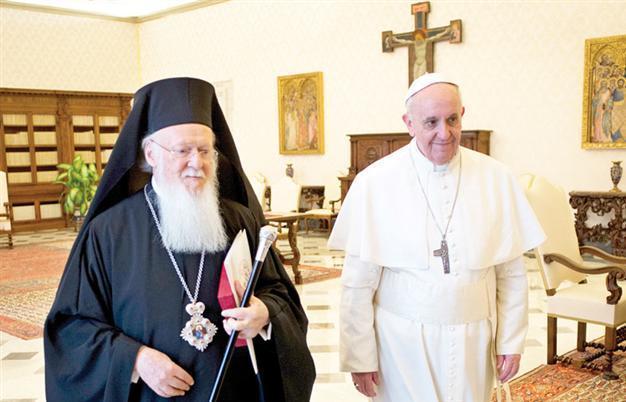Orthodox patriarch thinks the new pope can reform Vatican

Pope Francis (R) walks with Patriarch Bartholomew in Vatican. AP photo
“Probably not in my lifetime,” Bartholomew I, the patriarch of the Orthodox church based in Istanbul said with a faint sigh, “But I believe there is a chance for the next generations to see the East and West churches reunited.”
Those are the first accounts of Bartholomew after returning from the inauguration ceremony of Francis I as the new pope of the Catholic faith on March 19. On March 22 Bartholomew was the guest of honor at a luncheon at Kadir Has University in Istanbul, in the neighborhood of the Patriarchate, practically a few streets away from it. The lunch was given after a ceremony at which MIT economist Daron Acemoğlu was awarded the “scholar of the year” prize for his book “Why Nations Fail” and there were a few in the office of the rector, Mustafa Aydın, to listen to Bartholomew’s observations on the new pope in answer to the questions of the guests.
Bartholomew was the first orthodox patriarch to attend the inauguration ceremony of a catholic pope at the Vatican in the last 959 years; that is since 1054, when Christianity split between the Eastern and the Western churches under the pressure of rising Islam. When Francis I invited him for the ceremony he did not hesitate this time. He thinks Francis “seems to be very different” from all former ones and has the “capacity” to reform the Vatican.
There are strong observations from Bartholomew during the few days he spent in Vatican. The schedule was for him to see Francis in San Pietro during the first sermon, then meet him with the representatives of all other religions present and a one-on-one meeting. But “to his surprise” Francis invited Bartholomew to join him and cardinals at the dinner in the guest house on the first night he arrived. Again to his surprise and apparently to the surprise of some cardinals as well, Francis asked him to bless the dinner, which he “gladly” did. The new pope was wearing a simple outfit, the dinner was a simple one and they talked for two and a half hours about not only the rapprochement between the Eastern and Western churches but also about environmental issues, Bartholomew’s expertise, and poverty issues, which Francis focuses on.
There are some other interesting observations by Bartholomew during the ceremony, such as Francis’ refusal to put on the posh red papal shoes, instead continuing to wear his ordinary black ones, preferring to wear a simple cross rather than a glamorous one, not blessing the crowd from the balcony with a cross and more interestingly, saluting them with a “Good evening,” like one of them; apparently unusual for a pope. Those actions might be an indication that Francis might start reforming the church by changing some names in the Vatican hierarchy; some cardinals might go. If it is recalled that Benedict XVI was the first pope in centuries to resign from the Holy See, allegedly upon a report on the ethical weaknesses of the Catholic Church, some administrative steps by Francis could be regarded as consequences.
But there are other important steps. Francis and Bartholomew are going to meet in Jerusalem January 4 to 6, 2014, during Orthodox Christmas to mark the 50th anniversary of the first step taken by Paul VI and Athenagoras, who met at the same place in 1964.
Having invited Francis to Istanbul, Bartholomew hopes to host the new pope here at the Halki Seminary being opened by the Turkish government after being closed for the last 42 years.
